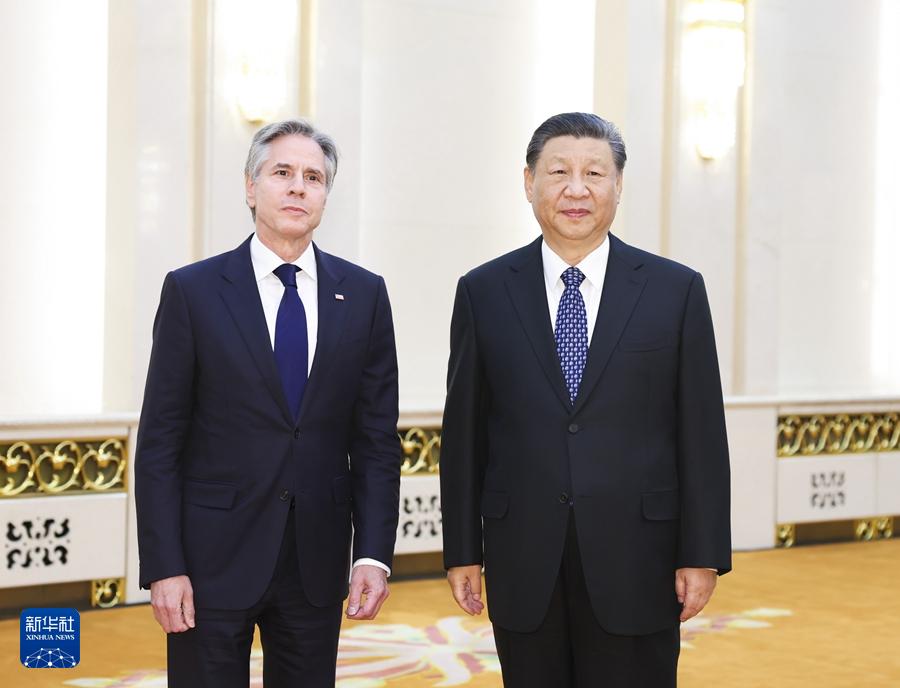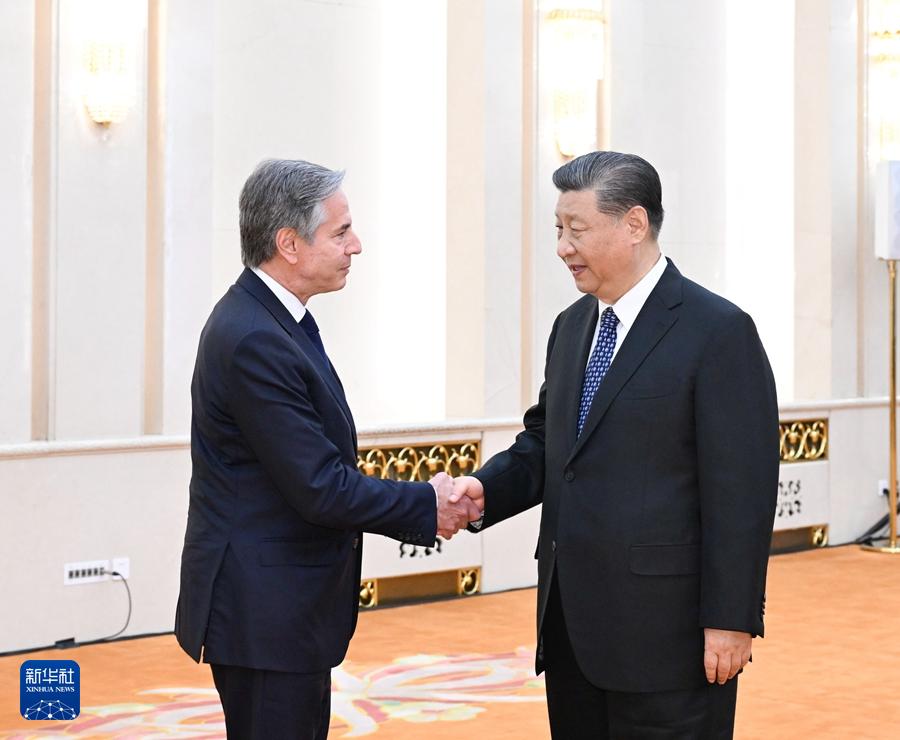We will stay firmly rooted in Chinese culture. We will collect and refine the defining symbols and best elements of Chinese culture and showcase them to the world. We will accelerate the development of China’s discourse and narrative systems, better tell China’s stories, make China’s voice heard, and present a China that is credible, appealing, and respectable.
习近平会见美国国务卿布林肯
发布时间:2024-04-28 08:31:19 | 来源:新华网 | 作者: | 责任编辑:张芃芃新华社北京4月26日电(记者刘华)4月26日下午,国家主席习近平在北京人民大会堂会见美国国务卿布林肯。

4月26日下午,国家主席习近平在北京人民大会堂会见美国国务卿布林肯。新华社记者 黄敬文 摄
习近平指出,今年是中美建交45周年。45年的中美关系历经风风雨雨,给了我们不少重要启示:两国应该做伙伴,而不是当对手;应该彼此成就,而不是互相伤害;应该求同存异,而不是恶性竞争;应该言必信、行必果,而不是说一套、做一套。我提出相互尊重、和平共处、合作共赢三条大原则,既是过去经验的总结,也是走向未来的指引。

4月26日下午,国家主席习近平在北京人民大会堂会见美国国务卿布林肯。新华社记者 申宏 摄
习近平强调,3周前,我同拜登总统通了电话,谈了对今年稳定发展中美关系的考虑,提出了双方应该以和为贵、以稳为重、以信为本。我还强调过,“得其大者可以兼其小”。当今世界正处于百年未有之大变局,怎么应对这个变局,这是个时代之问、世界之问。我给出的答案就是推动构建人类命运共同体,这已经成为中国外交的旗帜,也受到世界许多国家欢迎。地球就这么大,人类面临这么多共同挑战。中国古人讲“同舟共济”,我看现在需要“同球共济”。人类社会休戚相关、福祸相依,各国你中有我、我中有你,大家应该为实现共赢、多赢凝聚最大共识。这是中国看待世界和中美关系的基本出发点。我始终认为,大国要有大国的样子,要有大国的胸怀和担当。中美两国应该为此作出表率,为世界和平承担责任,为各国发展创造机会,为全球提供公共产品,为世界团结发挥积极作用。
习近平强调,我同拜登总统旧金山会晤时,提出了共同树立正确认知、共同有效管控分歧、共同推进互利合作、共同承担大国责任、共同促进人文交流5根支柱。这是中美关系这座大厦应该有的四梁八柱。大的原则定了,其他问题就好办了。中方愿意合作,但合作应该是双向的。我们不怕竞争,但竞争应该是共同进步,而不是零和博弈。中方坚持不结盟,美方也不要搞“小圈子”。双方都可以有自己的朋友和伙伴,不要针对对方,不要反对对方,不要损害对方。中方乐见一个自信开放、繁荣发展的美国,希望美方也能积极正面看待中国的发展。
习近平强调,中国有句话,“不日进,则日退”。中美关系也是这样。中美关系企稳的势头来之不易。希望双方团队继续努力,积极落实我同拜登总统达成的“旧金山愿景”,使中美关系真正稳下来、好起来、向前走。

4月26日下午,国家主席习近平在北京人民大会堂会见美国国务卿布林肯。新华社记者 申宏 摄
布林肯首先转达拜登总统对习近平主席的问候,表示,拜登总统同习近平主席旧金山会晤以来,双方在两国交往、禁毒、人工智能、人文交流等领域合作取得积极进展。当今世界面临很多复杂挑战,都需要美中两国合作应对。访华期间,我接触到的美国各界在华人士也都希望看到美中关系改善。美方不寻求“新冷战”,不寻求改变中国体制,不寻求遏制中国发展,不寻求通过同盟关系反对中国,无意同中国发生冲突。美方坚持一个中国政策,希望同中方保持沟通,认真落实两国元首达成的旧金山共识,寻求更多合作,避免误解误判,负责任地管控分歧,推动美中关系实现稳定发展。
习近平请布林肯转达对拜登总统的问候。
王毅参加会见。
Xi meets U.S. secretary of state
BEIJING, April 26 (Xinhua) -- Chinese President Xi Jinping met with U.S. Secretary of State Antony Blinken at the Great Hall of the People in Beijing on Friday afternoon.
Noting that this year marks the 45th anniversary of diplomatic relations between China and the United States, Xi said over the past 45 years, the relationship has gone through wind and rain, and the two sides can draw a few important lessons.
China and the United States should be partners rather than rivals; help each other succeed rather than hurt each other; seek common ground and reserve differences rather than engage in vicious competition; and honor words with actions rather than say one thing but do another.
Xi said he proposed mutual respect, peaceful coexistence and win-win cooperation as the three overarching principles for the relationship, which are both lessons learned from the past and a guide for the future.
Xi emphasized that in his phone call with President Joe Biden three weeks ago, he shared his thoughts on how to stabilize and develop China-U.S. relations in 2024, and underlined that the two sides should value peace, prioritize stability, and uphold credibility.
"The finer details will fall into place when they are aligned with the bigger picture," Xi said he once stressed. The world today is undergoing transformation not seen in a century. How to respond to it is a question of the times and of the world.
Xi said his answer is to build a community with a shared future for mankind, which has become a flag of China's foreign policy and has been welcomed by many countries.
Planet Earth is only this big, and humanity is faced with so many common challenges. As an old Chinese saying goes, "Passengers in the same boat should help each other," he said.
"Today, as I see it, dwellers of the same planet should help each other. We live in an interdependent world and rise and fall together. With their interests deeply intertwined, all countries need to build maximum consensus for win-win and all-win outcomes. This is the basic starting point for China to view the world and the China-U.S. relationship," Xi said.
Xi underlined his view that major countries should behave in a manner befitting their status and act with broad-mindedness and a sense of responsibility.
He said China and the United States should set an example in this regard, undertake responsibilities for world peace, create opportunities for the development of all countries, provide the world with public goods, and play a positive role in promoting global unity.
Xi underscored that in his meeting with President Biden in San Francisco, he proposed five pillars for China-U.S. relations, namely, jointly developing a right perception, jointly managing disagreements effectively, jointly advancing mutually beneficial cooperation, jointly shouldering responsibilities as major countries, and jointly promoting people-to-people exchanges.
They should serve as the underpinning for the mansion of China-U.S relations. When the overarching principles are established, specific issues will become easier to address, Xi said.
"China is willing to cooperate, but cooperation should be a two-way street. China is not afraid of competition, but competition should be about progressing together instead of playing a zero-sum game," Xi said.
China is committed to non-alliance, and the United States should not create small blocs. While each side can have its friends and partners, it should not target, oppose or harm the other, he added.
"China welcomes a confident, open, prosperous and thriving United States, and hopes the United States will also look at China's development in a positive light," said the Chinese president.
Xi stressed that as a Chinese saying goes, "No progress means regress," it also applies to China-U.S. relations.
Noting that the stabilizing trend in China-U.S. relations did not come by easily, Xi said it is hoped that the two teams will continue working actively to follow through on the San Francisco vision he and President Biden reached, so as to truly stabilize, improve and move forward the bilateral relations.
Secretary Blinken conveyed President Biden's greetings to President Xi. He noted that since President Biden and President Xi met in San Francisco, the United States and China have made good progress in their cooperation in such areas as bilateral interactions, counter-narcotics, artificial intelligence and people-to-people exchanges.
Blinken said the multiplicity and complexity of the challenges the world faces require the United States and China working together, adding that the Americans from all walks of life that he met during the visit all expressed the hope to see U.S.-China relations improve.
The United States does not seek a new Cold War, does not seek to change China's system, does not seek to suppress China's development, does not seek to revitalize its alliances against China, and has no intention to have a conflict with China, said Blinken.
The United States adheres to the one-China policy, Blinken said, adding that the United States hopes to maintain communication with the Chinese side, follow through on what the two presidents agreed in San Francisco, seek more cooperation, avoid misunderstandings and miscalculations, responsibly manage differences, and achieve stable development of U.S.-China relations.
President Xi asked Secretary Blinken to convey his regards to President Biden.
Wang Yi participated in the meeting. ■

